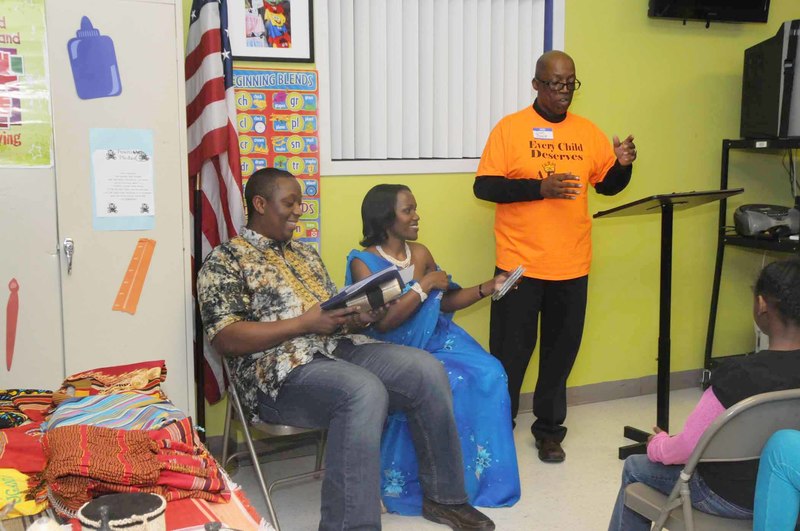WSNB celebrates Black History Month

With the onset of Black History Month, instructors at West Side New Beginnings were looking for a way to teach the kids black history but in a more tangible way.
Although the students knew about Harriet Tubman and Martin Luther King Jr., the teachers wanted the kids to be able to see examples of African-Americans succeeding right in their own community.
Program Director Diaz Bonville said, “When you see someone who looks like you, then you feel like, ‘If they could do it, I could do it.’”
To that end, Bonville has created a program that will have different African-American speakers come in and talk to the students every month. He said the speakers would come from all walks of life: doctors, lawyers and educators.
On Feb. 7, the first program hosted its first speakers, Dr. Edward Babigumira and his wife, Rose, both natives of Africa who now live in Long Neck, where Dr. Babigumira, a Ugandan native, has a pain management practice.
Rose Babigumira, a stay-at-home mother, is also from Uganda; her parents are originally from Rwanda.
Rose said the relationship between parents and children is much different in Uganda. While parents and their kids can be very close in America, in Uganda, parents run things in a very disciplined, almost military-like way, telling the kids how to do things and what to do, she said.
Her father placed an emphasis on his eight children getting an education. Rose went to the best schools in the area, but she was always barefoot. Her father said he would not buy fancy shoes like the other kids had. “All you need is your head,” he told her.
Growing up in central Uganda, Rose said her native area had a humid climate similar to Hawaii; most people did not have air conditioning.
Rose said she and Edward had two marriage ceremonies – a traditional wedding and, in their case, a Catholic church wedding. The traditional Ugandan wedding is a very detailed and elaborate affair, which starts with the groom asking the father for permission to marry. If the father says yes, he questions the groom on his religion and what region or tribe the groom is from. Rose said this is a big deal, because of the rivalry between those from Northern and Southern Uganda.
“It’s very different culture,” she said. “It wouldn’t go down well.”
Once a date is set, the families come together for an all-day ceremony hosted by the bride’s father. Rose said 500 to 600 people attend the wedding, which is filled with dancing, drinks and food.
Following a ceremony, the families gather this time at the groom’s house, where the couple drink a cup of milk, and a little boy and girl each take a sip, as a blessing for the couple’s future children. The bride cuts off a lock of her hair, as a symbol of her becoming a woman. The new couple are given seeds to plant, signifying they now must make their own way.
Rose said she came to America in 2004 to look for the American dream. She and Edward had met before in Uganda; he had come to the United States much earlier to study at Baylor University and Louisiana State University. The two became a couple after she came over, and now they have two children together.
The Babigumiras try to go back to Uganda when they can, but they have not been back since 2009. Rose said she hopes they can go back this year.
Nearly 60 people came to hear the Babigumiras speak at the first of West Side’s new speakers bureau, as Bonville called it. Bonville said the second speaker was his brother-in-law, Bruce Duffy, who recited Martin Luther King’s “I have a dream” speech Feb. 28.
“A lot of people just hear part of it. But he goes from the very beginning to the very end. He does it very well,” Bonville said.
Other speakers are still being lined up, but Bonville said he hopes to include educators, business owners, nurses and doctors.
Ryan Mavity covers Milton and the court system. He is married to Rachel Swick Mavity and has two kids, Alex and Jane. Ryan started with the Cape Gazette all the way back in February 2007, previously covering the City of Rehoboth Beach. A native of Easton, Md. and graduate of Towson University, Ryan enjoys watching the Baltimore Ravens, Washington Capitals and Baltimore Orioles in his spare time.

























































